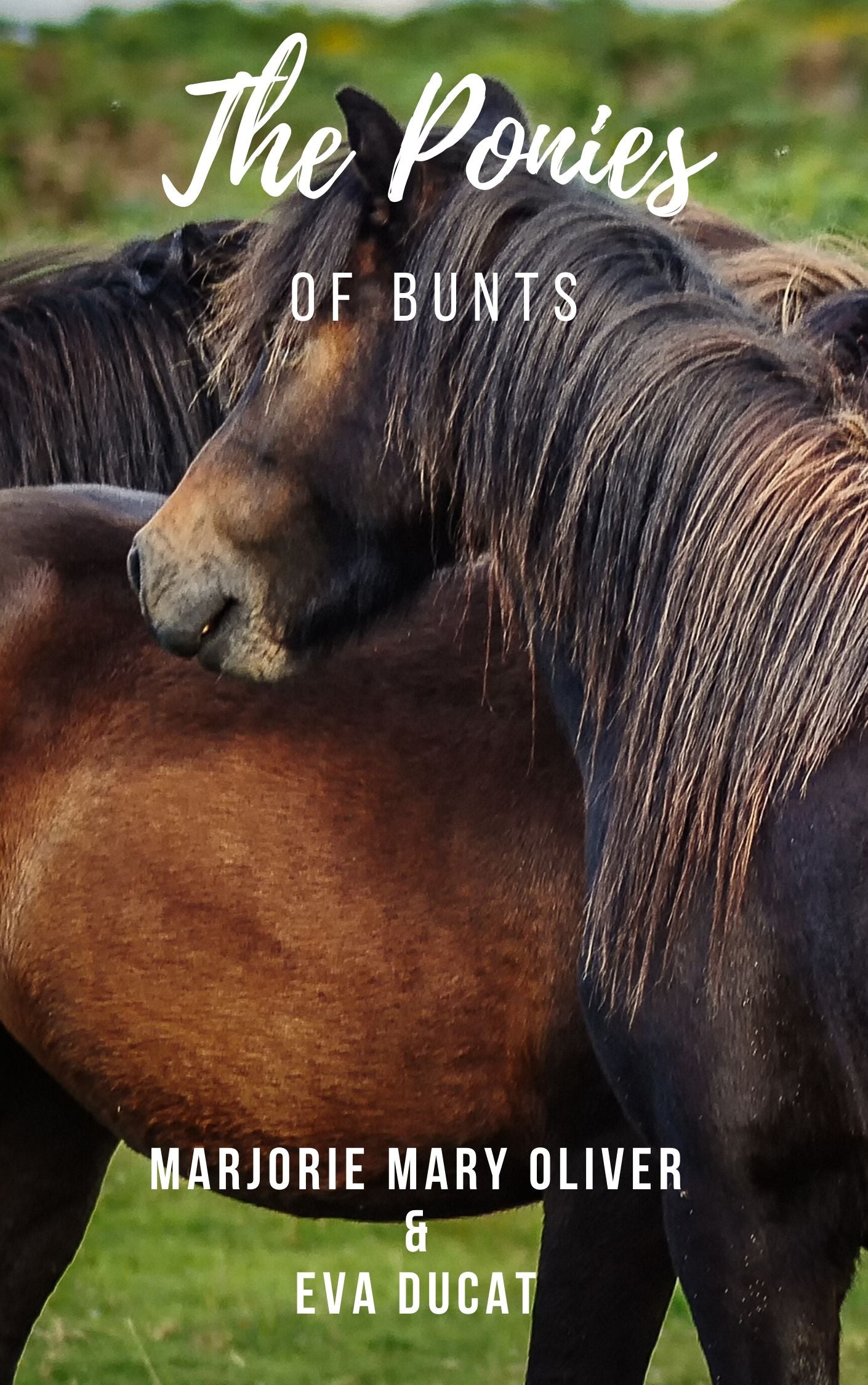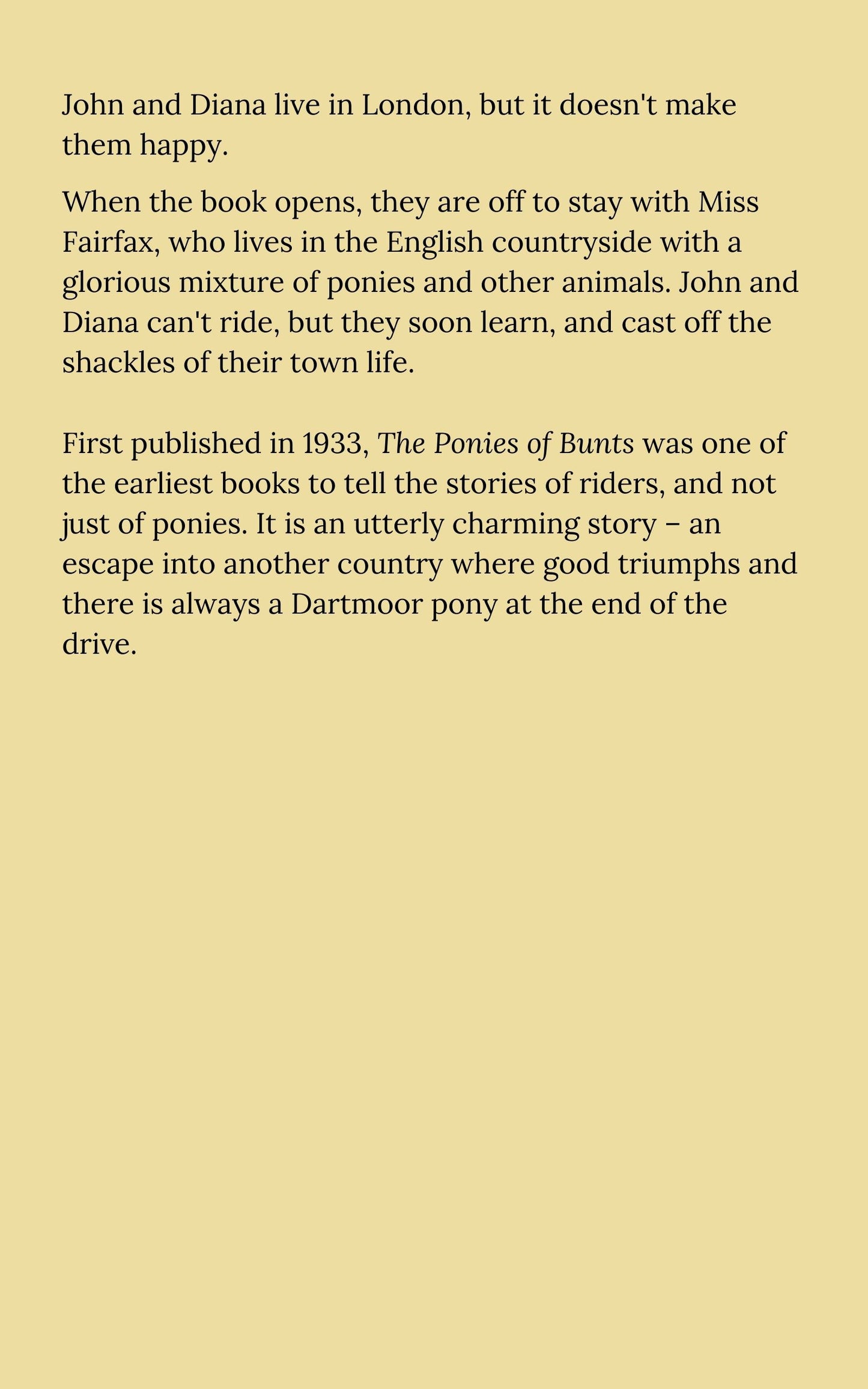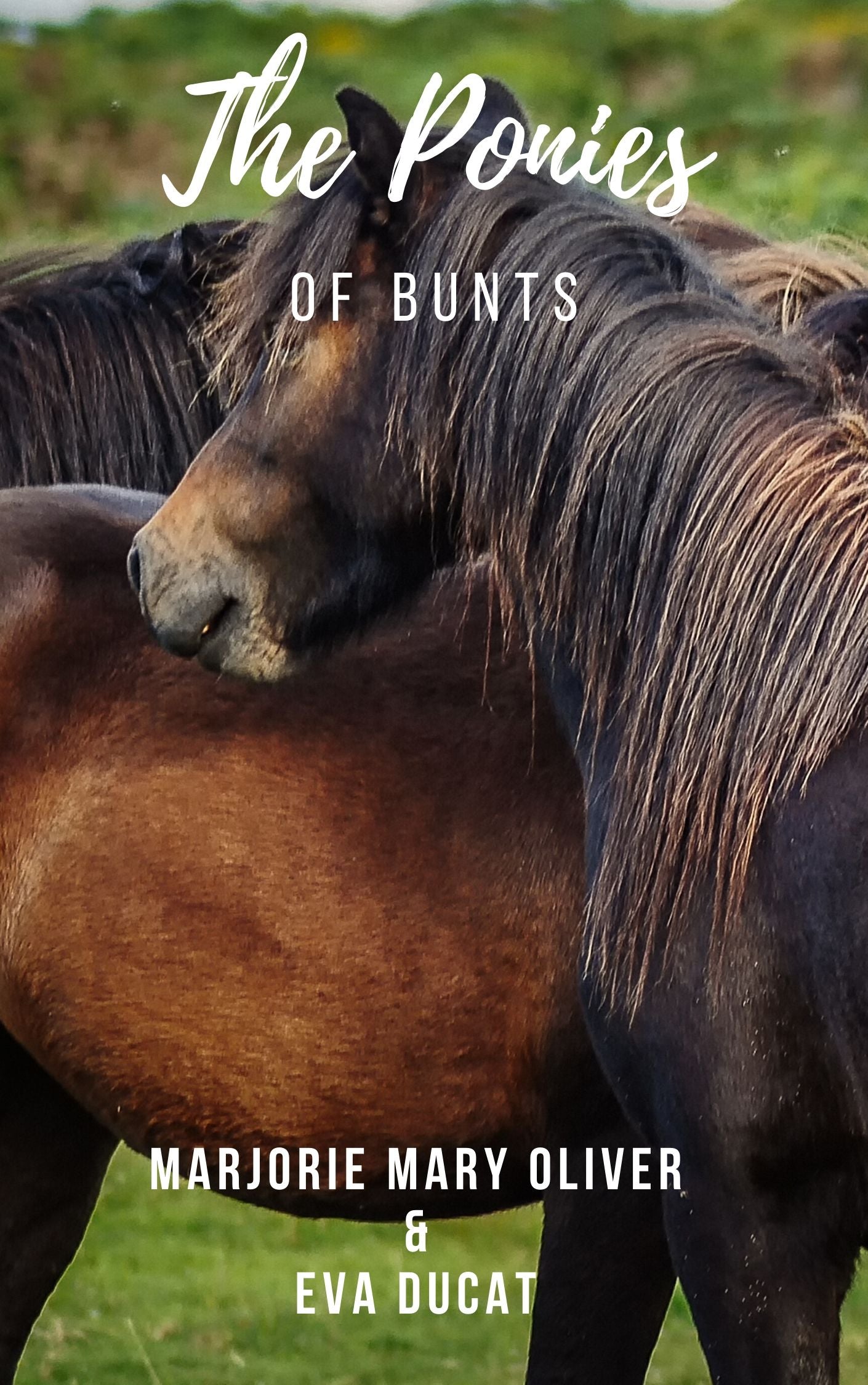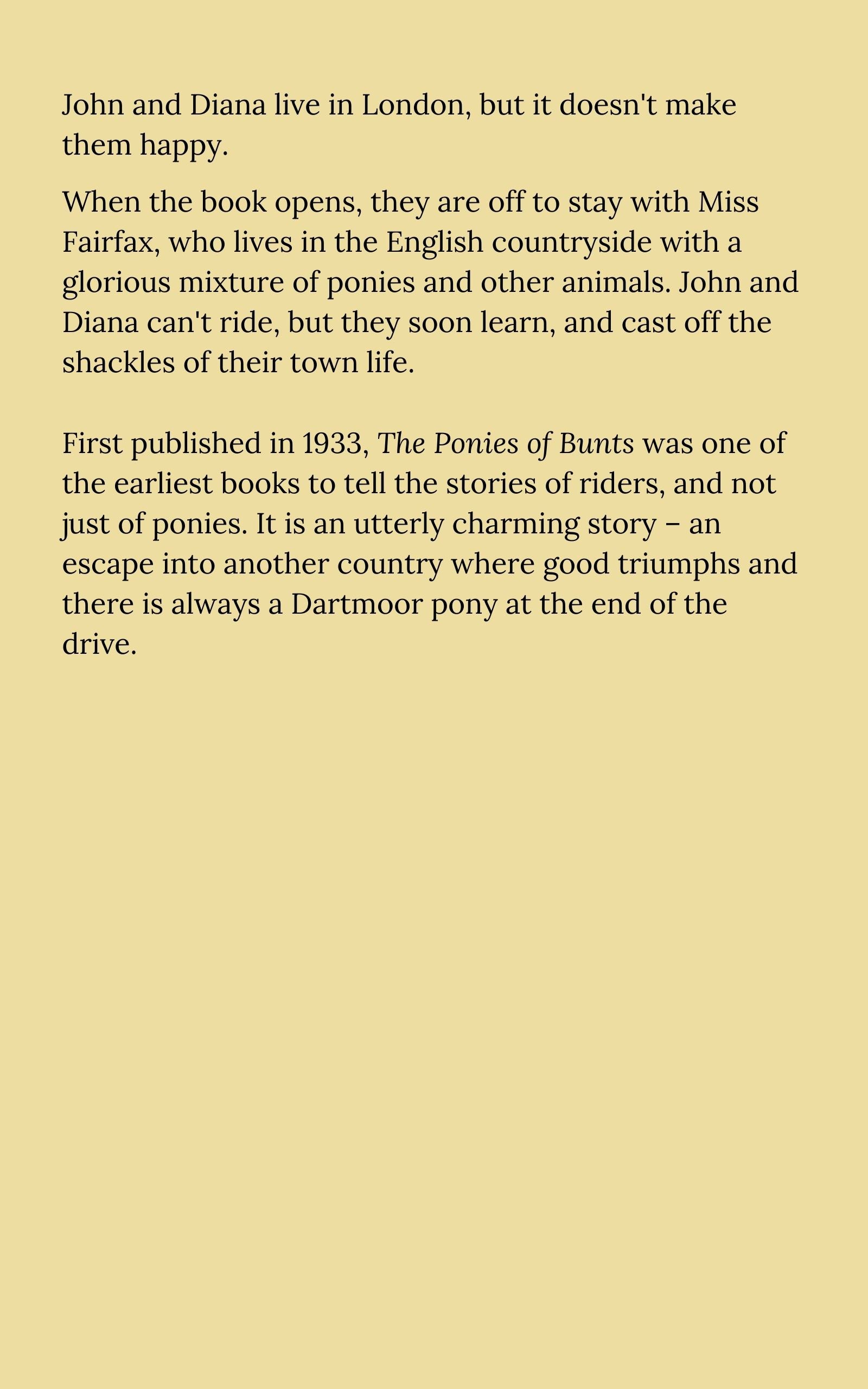Jane Badger Books
Marjorie Mary Oliver and Eva Ducat: The Ponies of Bunts (eBook - Bunts 1)
Marjorie Mary Oliver and Eva Ducat: The Ponies of Bunts (eBook - Bunts 1)
Couldn't load pickup availability
Share
John and Diana live in London, but it doesn't make them happy. When the book opens, they are off to stay with Miss Fairfax, who lives in the English countryside with a glorious mixture of ponies and other animals. Neither John nor Diana can ride, but they soon learn, and cast off the shackles of their town life. First published in 1933, The Ponies of Bunts was one of the earliest stories to tell the stories of riders, and not just of ponies. It is an utterly charming story – an escape into another country where good triumphs and there is always a Dartmoor pony at the end of the drive.
Bunts series 1
Page length: 203
Original publication date: 1933
How do I get my book?
How do I get my book?
There's a link to download in your confirmation email. If you need help, the email from Bookfunnel, who handle our delivery, will walk you through downloading the file that works best for you.
How do I read my eBook?
How do I read my eBook?
You can read the ebooks on any ereader (Amazon, Kobo, Nook), your tablet, phone, computer, and/or in the free Bookfunnel app.
Read a sample
Read a sample
“JENEFER, Jenefer,” called Miss Fairfax from the stable-yard, “you’ll be late if you don’t start. Are you ready? The ponies are waiting.”
“Coming—coming,” answered a distant voice faintly.
“I wish I knew when,” remarked Miss Fairfax, with a charming smile to the children standing beside a small four-wheeled cart with a pair of Dartmoor ponies ready harnessed in it. “She’s sure to be late.”‘ she continued, adding with unruffled calm, “nothing in the world is so trying as unpunctuality.”
“If she doesn’t get to the station before the train comes in, it won’t be any good,” said little Pat Forbes anxiously, “because Diana and John won’t know she’s coming to meet them, and their mother will bring them up with her in the car. So they’ll miss their drive with Timmie and Rice.”
The five children standing in the stable-yard with Miss Fairfax looked aghast at Pat’s forebodings, for this was no common occasion. Timmie and Rice had been brought in from the field by the children a good hour before it was necessary, and they had supervised every movement of Green, the coachman, while he groomed and harnessed them. They had fetched the whip, and remembered to put in the rug themselves, and now hardly took their eyes off the ponies as they stood champing their bits, and pawing the ground, impatient to be off.
Since early morning the whole household had seethed with excitement in anticipation of the arrival of two strange children from London, Diana and John Ridley, the bosom friends of Susan and Pat Forbes.
It was all due to Miss Fairfax; no one could cure her of her twin virtues of indulgence and hospitality. She was never so happy as when she had filled her old house at Bunts full to overflowing; she liked one or even two visitors in every room, some said in every bed. So when she heard from Susan and Pat, who had enjoyed the free run of her house ever since they were born, that they had left their dearest friends Diana and John Ridley languishing behind them in London, with no riding, no animals, and condemned to a daily walk in Kensington Gardens, her pity knew no bounds, and she exclaimed at once: “Why shouldn’t they come here and learn to ride, and grow up decent men and women? Why should they stick in that abominable London? We’ll have them here. I’ll write to their mother.”
The next morning in London, to the unspeakable excitement of Diana and John, the invitation arrived, and after some wrangling with their parents, was accepted. All that remained to do now, therefore, was to meet them at the station, and Miss Fairfax had just asked for the twentieth time, “When is Jenefer coming?” when a slight, swift figure was seen running along the garden path, and a laughing girl of about twenty sprang into the cart and gathered up the reins, almost before they were aware she was among them.
“I’m so sorry!” she cried to Miss Fairfax, “I could not help it, I was obliged to attend to the goats. Now, children, hurry up and open the gate for me, and you, Derek, jump in and come to the bottom of the drive to open the gate there. All right, Green—let them go.” It was all done so quickly that the ponies were moving out of the yard while the children were still scattering and Miss Fairfax was calling out: “Don’t hurry my ponies; take them quietly for the first mile, at any rate.” Then, raising her voice as the cart drew further into the distance, she called out a last injunction: “Think of my ponies—never mind the train.”
Great as was the excitement at Bunts, it paled before the feelings of Diana and John as they drew near their destination. They had had the delights of Bunts described to them so often by Susan and Pat, that they were on fire to taste them for themselves. Their last night at home they had scarcely slept for excitement, and were awake with the first birds, so eager were they for the journey. The weather was early spring, the month was April, and, as they left London behind them, the country gradually unfolded itself clothed in pale, lovely colours. The primroses were in the woods, every bird was singing, and the trees were bursting into leaf. The further they left London behind them the more delighted they felt. They were deep in the country before they reached the little wayside station five miles from Bunts, where they were to leave the train; in their excitement they bundled out in a great hurry, but there was no one on the platform to meet them. A porter, who looked after their luggage, told Mrs. Ridley, who had come with her children, that they would find a car waiting for them outside.
As they emerged into the station-yard, Jenefer, who had managed to arrive in the nick of time and was standing by her ponies, thought: “Are those the Ridleys? What a beautiful family! The mother is as lovely as the children.” Her second thought was: “But how white they all look! Anyone can see they are Londoners—”
Then she went up to the slim, elegant lady who was preparing to get into the car. “I think you must be Mrs. Ridley?” she said. “My name is Jenefer Tremayne, and I live at Bunts.”
The children, looking up at her shyly, saw a pair of soft brown eyes, a mass of wavy hair, and a face which looked as fresh as the country itself.
Jenefer, on her side, noticed that Diana had a lively, roguish expression with her blue eyes and golden curls; while John, with straight hair and big grey eyes, looked more serious. “Dear me,” she thought to herself, as she looked at them, “what a pair of curly heads we shall have at Bunts! There’s Susan’s, and now here comes Diana’s!” Aloud, she said to Mrs. Ridley: “Miss Fairfax has sent a car to meet you, but I have driven down with the ponies as well, in case Diana or John would rather drive up with them.”
As she spoke she pointed to Timmie and Rice, who were standing quite by themselves, as good as gold, a perfect pair of little Dartmoor ponies, both of them a rich dark brown with black manes and tails. They might not be very smartly groomed, and perhaps neither their harness nor their cart was very new, but they themselves were little beauties, and as they stood there stretching out their necks and switching their long tails after their five-mile trot, they looked so knowing, and so clever, and so friendly, that both children felt their hearts go out to them.
“Come and talk to Timmie and Rice,” said Miss Jenefer invitingly, “they love being noticed.”
She had a soft voice which sounded like laughter, and the children found it often fulfilled its promise, and broke into an enchanting gurgle.
“Are you driving back with me?” she asked as they patted the ponies; “there would be just room for both of you on the front seat.”
Diana and John took one look at her and then broke away to their mother. “Can we go with the ponies?” they cried. “Oh! Mummy, do say we may, do let us!”
Mrs. Ridley concealed her astonishment. She too had been eyeing the turn-out, and her opinion of it was quite different from the children’s. “Would you like it?” she asked doubtfully. “Wouldn’t you rather come in the car with me?”
“No, no,” they both cried at once with more candour than politeness; “we want to drive with the ponies. We hate the old car.”
Miss Jenefer began to laugh, and seemed to think it was all settled.
“Very well, then,” she said in her soft voice, “I’ll get up first, because you must never get into a cart, you know, until the coachman is up and holds the reins. We shan’t be at Bunts as soon as you will,” she said, smiling, as Mrs. Ridley helped first Diana and then John to clamber up, “but I will take the greatest care of them, and we shall turn up some time.”
Now it so happened that Diana and John had a big car at home and had never driven behind a pair of ponies in their lives, and when Timmie and Rice began to trot they were enchanted at the merry patter their hoofs made, for it sounded like a gay accompaniment following them wherever they went; Jenefer turned out of the station-yard and they found themselves on a wide road, with telegraph poles running along the side. It was just the kind of road Diana and John knew well from motoring, and there were numbers of cars travelling up and down it now; in fact, several rushed past them in the first few minutes; but the children were surprised to see that Jenefer, far from pulling into the ditch, took her full share of the road, and when one went hooting by in a great hurry, she said: “Beastly things—I don’t know why they think they’ve bought the road!”
This was a point of view the children had never heard before; they had taken it for granted that the road belonged to the motors, and that it was everyone’s business to get out of their way. They were careful, however, not to say so, and presently they noticed that one or two cars, generally driven by gentlemen, pulled aside and made way for the ponies, and when that happened Miss Jenefer made a little salute with her whip, as if she was making an acknowledgement to persons who understood right behaviour.
When they had driven about a mile and had passed several cottage gardens gay with daffodils and spring flowers, each one of which looked prettier than the last, they came to a little copse, where a narrow road joined the main thoroughfare. It was a road it would never have occurred to Diana and John to use, for, instead of being wide and straight as motors love, it was narrow, and twisted at once round a corner: but no sooner did the ponies come to it than they turned their noses joyfully towards it, and Miss Jenefer exclaimed: “Thank goodness; now we can leave that slippery abomination of a road behind us, and have a little peace.”
The children did not understand this at all; but they were far too absorbed watching Timmie and Rice and their amusing ways to ask questions, and they had not gone twenty yards along the lane when they found themselves in a new, an enchanting world. The hedges disappeared, and instead, the road wound through smooth green sward running into true English woodland on either side, and the children saw that the bright April sun threw shadows from the big oak trees over ground dappled with delicate white wood anemones and clumps of pale primroses.
Long before they were tired of it, this beautiful woodland came to an end, and the lane, plunging down between two deep green banks, became so narrow that the wheels of the pony-cart almost touched either side.
“What should we do if we met a motor here?” asked Diana suddenly.
“Why, either they, or we, should have to back to the nearest gateway,” answered Miss Jenefer, as if it were the most natural thing in the world.
“Has that ever happened?” asked John solemnly.
“Oh yes!” said she easily; “once I met a hay-cart, in a lane as narrow as this, with such an enormous load the horses couldn’t possibly back, so I had to make my ponies back and back nearly all the way we’d come. I did get so tired of it, and so did the ponies. They hated it.”
Who's in the book?
Who's in the book?
Humans:
Diana and John Ridley, Mrs Ridley, Miss Fairfax, Jenefer, Roddie, Derek, Jane, Susan, Pat
Equines:
Timmie, Rice, Ludifer, Sago, Grey-Mist, Peewit, Josephine
Other titles published as
Other titles published as
Series order
Series order
1. The Ponies of Bunts
2. Sea Ponies
3. Ponies and Caravans


Old-style happy-ever-after story in which the ponies are characters as well as the children and adults.
However, without giving too much away, I couldn't quite believe the children would have been so forgiving of Roddie - or that a married couple would have thrown away their work and lifestyle to be where their children wanted!


